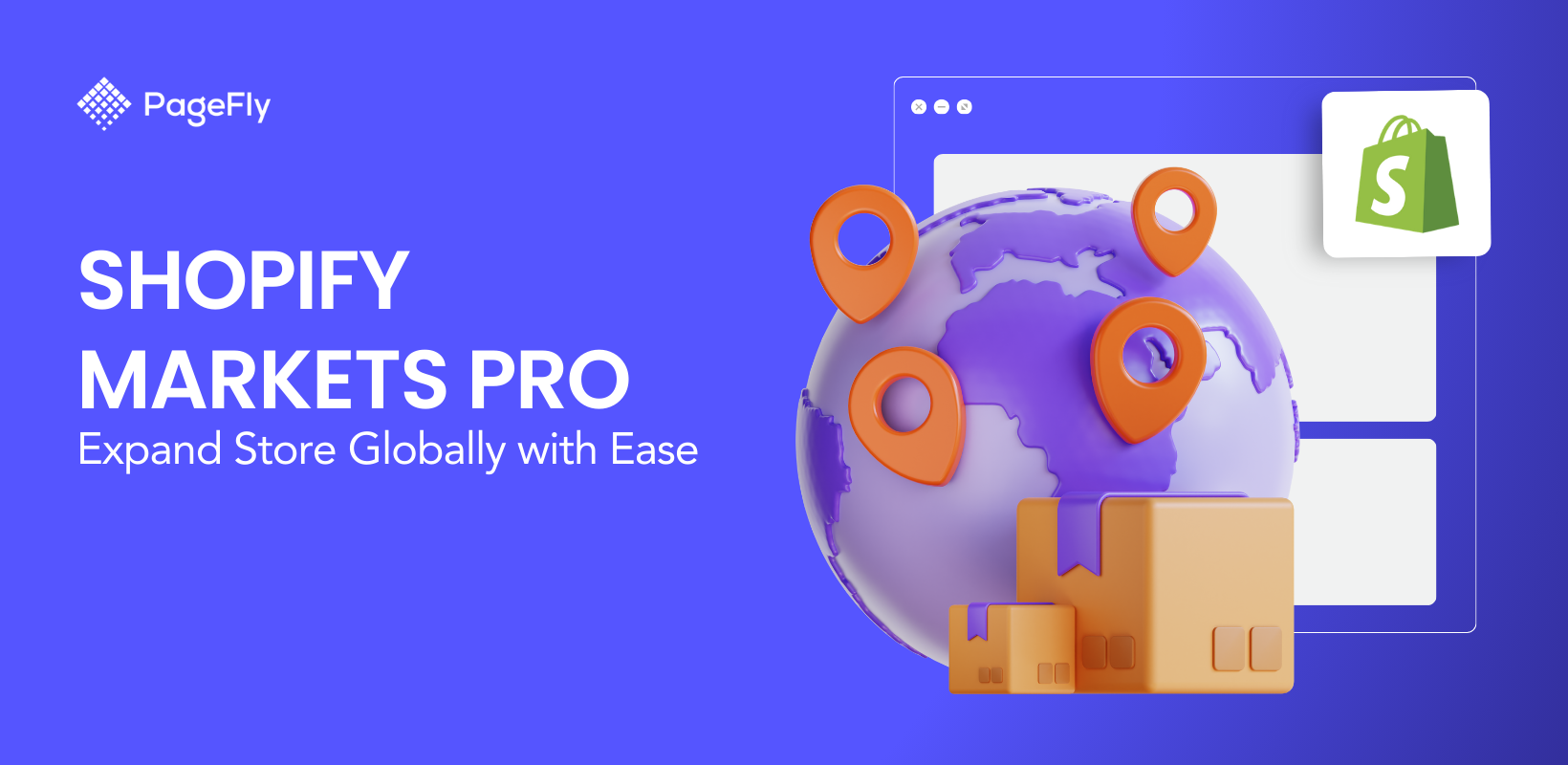Global e-commerce is projected to reach $6.3 trillion in 2024 (source: orbelo.com/), showcasing immense opportunities for businesses to expand globally. Shopify Markets Pro offers a powerful solution to help merchants navigate international markets, simplifying complex processes like tax compliance and cross-border payments.
This guide not only explores Shopify Markets Pro’s key features, pricing, and pros and cons, but also provides expert advice to help you assess whether it fits into your global growth strategy. Understanding how does Shopify work alongside these advanced features will empower your business to make informed decisions.
Understanding Markets Pro: Is It Right for Your Business?
What is Shopify Markets Pro?
Shopify Markets Pro is an all-in-one cross-border solution that allows brands to expand into global markets effortlessly. While Shopify Markets provides foundational tools for international sales, Markets Pro elevates the experience with enhanced automation, compliance support, and advanced tools that simplify global transactions, making it ideal for businesses aiming for significant international expansion.
Powered by Global-e, Markets Pro removes the headache of manual management, letting you focus on scaling your business. With this global selling solution, businesses can seamlessly manage cross-border operations, handling challenges like international shipping, taxes, and compliance without needing third-party apps or complex integrations.
According to the Shopify announcement on June 24th, 2024, Shopify Markets Pro was renamed Managed Markets, a change intended to better reflect your objectives while ensuring that no existing features or admin experience will be impacted.
Markets Pro Key Features
Markets Pro offers essential features that simplify global selling for businesses. Key aspects, including global compliance, automated tax calculations, local payment options, and multi-currency support, significantly enhance the international shopping experience.
Now, let's explore these remarkable features in detail:

Global Compliance
One of the most significant advantages is that this global platform handles the often confusing aspects of international regulations, including tariffs, duties, and shipping restrictions. This compliance management ensures that your business avoids costly mistakes when entering new markets.
Additionally, it automatically assigns Harmonized System (HS) codes to products, identifies restricted items in specific regions, and keeps regulations updated.
Automated Tax and Duty Calculations
This platform automates the complex tasks of calculating and collecting taxes and duties for international sales, eliminating uncertainties associated with fluctuating estimates. The duty and tax amounts are displayed during the checkout process, ensuring that customers are clear about their total payment, which helps decrease the cart abandonment rate.
Local Payment Methods
Markets Pro allows businesses to offer local payment options, simplifying the purchasing process for international customers. This feature enables customers to pay using their preferred methods, which increases conversion rates, and enhances the overall user experience, particularly in areas where common payment methods may not be prevalent.
Multi-Currency and Language Support
This feature allows merchants to display product prices in local currencies and present content in preferred languages, providing a more personalized shopping experience that caters to diverse global audiences.
Comprehensive Shipping Solution
Shopify Managed Markets offers enhanced shipping features to streamline international order fulfillment. Merchants can leverage integrated shipping options with DHL Express for fast delivery, utilize a list of approved third-party logistics (3PL) providers, and connect existing warehouses via a shipping API.
This comprehensive approach ensures efficient processing of international shipments, ultimately improving customer satisfaction. For more details, visit Shopify's official documentation on Managed Markets Shipping.
Guarantee Foreign Exchange and Fraud Protection
This global selling platform offers enhanced security measures against fraud for international orders, improving upon the standard Shopify Markets. Additionally, Markets Pro locks in the exchange rate for 30 days after an order is placed, ensuring stability and protecting against potential losses due to currency fluctuations.
Who should use Shopify Markets Pro?
Markets Pro is particularly beneficial for medium-to-large-sized businesses looking to scale internationally. These enterprises typically have established operations in their domestic markets, generating sufficient revenue to justify the investment in advanced features.
The platform's automation capabilities are especially valuable for brands with extensive product catalogs or those already shipping to multiple countries, as it simplifies compliance with diverse regulations and streamlines logistics.
Additionally, larger businesses often face more complex customer needs, such as varied payment preferences and currency conversions, making Markets Pro an ideal solution to enhance their international shopping experience.
Ultimately, while all Shopify merchants can utilize the platform, those with substantial growth ambitions and operational complexity will gain the most from its robust features.
Glasvin’s Case Study
The case of Glasvin, a high-end glassware brand, exemplifies why Shopify Markets Pro is particularly advantageous for medium to large businesses.
Initially, Glasvin experienced strong sales but faced rising shipping costs and unexpected taxes when expanding into markets like the UK, Canada, and Europe. These challenges hindered their growth and affected customer satisfaction.
However, after implementing Managed Markets, Glasvin saw a remarkable 71% increase in international sales. The platform streamlined transactions, automated tax compliance, and optimized shipping logistics, enabling Glasvin to scale effectively while delivering a localized shopping experience.
This transformation highlights how Shopify Markets Pro empowers businesses with complex operational needs to achieve global success seamlessly.

Shopify Markets Pro Pricing
Shopify Markets Pro charges a 6.5% transaction fee on international sales, covering the total order value, including local payment methods, tax remittance, express shipping, and guaranteed exchange rates. It also applies a 2.5% currency conversion fee for handling international transactions.
For example, if you sell a product for $100:
- If it's an international transaction: Fee = Transaction fee (6.5%) = 6.5% × $100 = $6.50.
- If the customer pays in a different currency: Total fee = [Transaction fee (6.5%) + Currency Conversion fee (2.5%)] x $100 = (6.5% + 2.5%) x $100 = $9.
In contrast, traditional Shopify Markets charges only a 4.2% fee but lacks the extensive tax and shipping benefits. For businesses aiming for long-term global growth, Markets Pro offers enhanced efficiency and reduced complexity, making it a potentially cost-effective solution.
To stay updated with the latest and detailed information on Shopify Markets Pro Pricing, we encourage you to refer to the official Shopify website.
Pros and Cons: Is It Worth Using?
Now, let’s clarify the pros and cons of Markets Pro to assess whether this service is cost-effective for your business.

Pros of Shopify Markets Pro
Comprehensive Global Solutions
This platform offers robust solutions for merchants venturing into international sales. It simplifies complex cross-border transactions by automating tax compliance, duties, and regulations, allowing businesses to focus on growth rather than administrative challenges
Enhanced Customer Experience
The Markets Pro significantly improves the customer journey by localizing shopping experiences. It allows merchants to display prices in local currencies and accept familiar payment methods, which helps to foster trust and boost conversion rates among international customers
Improved Security
This advanced version of Shopify Markets enhances safety and security by providing tools for fraud detection. This minimizes the financial risks associated with international transactions, giving merchants peace of mind while expanding into new markets
Enhanced Automation and Efficiency
The platform increases operational efficiency through automation in shipping and fulfillment processes. By integrating with logistics partners, Shopify Markets Pro streamlines order management, enabling faster deliveries and simplifying the overall operational workflow for businesses.
Cons of Shopify Markets Pro
In addition to its numerous advantages, this platform also presents certain limitations:
Higher Fees
Shopify Markets Pro applies a flat 6.5% fee on all international sales, which covers duties, taxes, and shipping, simplifying the payment process. However, this flat rate can lead to higher costs for businesses with large international volumes. Shopify Markets, on the other hand, allows merchants to work with third-party providers for duties and taxes, offering flexibility to potentially reduce costs.
Additionally, currency conversion fees on Markets Pro are higher at 2.5%, compared to 1.5% on Shopify Markets. Shipping with Markets Pro is tied to DHL Express, which may limit options for more cost-effective alternatives.
Although these features facilitate global expansion, the fixed fees might make Markets Pro a costlier option for some businesses compared to Shopify Markets. Businesses should factor in Shopify maintenance costs, which can impact the overall budgeting for international growth.
Geographic Limitations
Shopify Markets Pro presents several geographic limitations that businesses should consider:
- Coverage Limitations: Shopify Markets Pro is available primarily to merchants registered in the United States, with limited access for some merchants in Canada and the United Kingdom. This means businesses outside the U.S. may have significantly restricted access to this feature, impacting their global reach.
- Feature Availability: Not all features are uniformly available across different countries or regions. For instance, some markets may lack certain localized payment methods or shipping options. This disparity can hinder the ability to provide a seamless shopping experience for customers in those regions.
- Tax Handling: Shopify Markets Pro offers tax compliance solutions, but these may not cover all countries comprehensively. Businesses operating in various regions may need to engage third-party services for more complex tax compliance issues.
- Localized Customer Experience: The effectiveness of features like local pricing and customer support can vary by region. This variability may affect the consistency of the customer experience, depending on how features are implemented.
Complexity in Management
Although the platform aims to simplify global selling, managing multiple regions can still be challenging. Merchants may encounter difficulties in customizing storefronts for different markets, requiring expertise that smaller teams might not possess. This complexity can hinder effective market penetration if not properly managed.
Shopify Markets Pro vs. Shopify Markets: The Comparison
Understanding the differences between Shopify's International and Markets Pro plans is essential for choosing the best option for your business. Below are the key comparisons:
Aspect | Shopify Markets | Shopify Markets Pro |
Fees for International Orders | From 4.2% transaction fee on international sales, depending on the Shopify plan | 6.5% transaction fee on total order value + 2.5% currency conversion fee for handling international transactions. This fee covers local payment methods, taxes, and shipping rates |
Cross-border Payments | Limited to a few payment options; primarily credit cards and PayPal | Supports a wide range of local payment methods, including Klarna, Sofort, PayPal, and other regional options |
Global Fulfillment and Shipping | Basic shipping options; merchants must manage logistics and fulfill orders independently | Comprehensive shipping solutions including access to real-time shipping rates, options for expedited shipping, and integrations with multiple carriers, improving delivery times and costs |
Duties and Taxes | Minimal automation; merchants often manage taxes manually | Automated tax calculations and remittance, handling VAT/GST compliance across different countries, which significantly simplifies the tax management process for merchants |
Localization | Basic localization features; merchants need to implement translations and adjustments for different markets themselves | Offers full localization of the checkout process and storefront, ensuring a tailored experience for customers in their preferred languages |
Market Processes | Merchants are responsible for all aspects of compliance, tax filing, and legal regulations in each target market | Global-e acts as the merchant of record, handling compliance, tax filing, and local regulations, reducing the complexity for merchants |
Shopify Markets and Managed Markets both serve as powerful tools for expanding into global markets, but they differ in scope and capability:
- Shopify Markets: It is indeed designed for small to medium-sized businesses seeking to sell internationally. Shopify Markets provides essential features such as domain redirection, currency conversion, and language localization to help businesses establish a basic global presence. However, it is primarily suited for businesses with simpler needs, offering them the ability to manage their global operations from a centralized Shopify admin but without advanced tools for handling more complex international operations.
- Managed Markets (formerly Markets Pro) expands on this by offering more comprehensive automation and compliance features. This solution caters to medium and larger businesses that require advanced tools like international tax and duty calculations, compliance management, and the ability to manage cross-border logistics. Managed Markets also eliminates the need for third-party apps to handle international operations, making it a robust solution for businesses looking to scale globally and streamline operations.
Before making a decision, consider your business goals, budget, and size to determine which plan aligns best with your needs.
Get started with Markets Pro: Things To Keep In Mind

Source: Shopify
Requirements for upgrading to Managed Markets
There are some requirements your business must meet to use Managed Markets:
- Your business must operate within the continental United States, excluding territories such as Puerto Rico and Guam.
- Shopify Payments is required for transactions.
- At least one fulfillment location must be situated in the United States.
- Your products must comply with the restrictions on prohibited or restricted items.
- Your products should adhere to the shipping requirements of Managed Markets.
Understand the Changes That Will Happen to Your Online Store
Integrating Managed Markets will fundamentally transform your online store, significantly enhancing its functionality for international sales. Here’s how:

Store Enhancements
- The payment gateway will switch to Managed Markets for international orders.
- Products will be categorized with Harmonized System (HS) codes, complying with country-specific regulations.
- Prices will adjust by a percentage to cover currency conversion fees.
Checkout Improvements
- Local payment methods will be integrated, simplifying transactions.
- Duties will be calculated and collected during checkout.
- Customer phone numbers will be collected for order updates.
- Shipping via DHL and UPS, with prepaid duties, will be offered.
- A disclaimer will clarify that Global-e is the merchant of record for international sales.
International Market Adjustments
- Markets are established for international regions where you sell.
- Incompatible countries will be excluded.
- Incompatible currencies will default to USD.
Online Store Features
- Your store will accept 136 currencies, enhancing accessibility.
- Automatic domain redirection will improve the international shopping experience.
- All orders will be fraud-checked for security.
Payment Processes
- Payouts will be in USD, with transaction data available on specific days.
- New transaction types for Managed Markets shipping labels will be included.
- Managed Markets will act as the merchant of record for international orders, streamlining compliance.
Step To Set Up Managed Markets
Let’s break down the step to upgrade your International Shopify online stores to Global ones:
- Step 1: Go to Settings from your Shopify admin, click Markets.

- Step 2: Scroll down and select Upgrade to Managed Markets or Turn on Managed Markets.

- Step 3 (Optional): In the shipping rates section, you can download or explore Managed Markets rates.
- Step 4: In the What happens next section, choose either Automatic or Manual upgrade after store review.
- Step 5: Accept the Terms of Service and click Submit to complete the update.
Shopify Markets Pro Review: What Merchants Are Saying
In this section, we’ll delve into insights from Shopify Markets Pro reviews to help merchants and businesses clearly understand this powerful solution. We've collected feedback from real users on Reddit and the Shopify Community, emphasizing its key benefits and some hidden drawbacks:
Many merchants appreciate how Markets Pro streamlines global expansion. By automating tax, duties, and currency conversions, it significantly reduces the administrative workload.
A standout success story comes from WOLFpak. Founder Michael shared how the platform enabled them to offer competitive pricing and free shipping in select regions, which helped lower cart abandonment rates. After implementing Markets Pro, WOLFpak saw an impressive 433% increase in global sales within 18 months, making international sales a key part of their strategy.
However, alongside the success stories, we’ve also found a number of complaints from both long-term and new users regarding some shortcomings. Here’s a quick overview of the main issues:
- Approval Issue: New products added to the International Markets must wait for approval before they can be displayed on Markets Pro. This delays visibility for customers in other countries, preventing them from making purchases promptly.
- Payment Delays: Some sellers have reported delays in payments when using DHL for shipping. Payments can take weeks or may even get stuck in the process.
- Slow Shipping: Complaints about DHL also extend to shipping times. Instead of the expected 7-9 business days, some customers experience delays of nearly 10 days without updates or tracking information.
Expert Opinions From Shopify merchants
Experts and merchants alike have praised Shopify Managed Markets for removing the friction in international sales. It simplifies everything from localized payment methods to logistics, making it easier for businesses to scale globally.
However, experts suggest that this solution is most advantageous for merchants experiencing significant international demand, typically defined by consistent global sales growth. Smaller businesses should carefully evaluate if the platform's costs align with their current scale and long-term global goals before investing in it.
Conclusion
Shopify Markets Pro presents a significant opportunity for global business growth through its advanced features and robust automation capabilities. Its effectiveness is underscored by numerous success stories from merchants who are currently utilizing the platform.
While some drawbacks exist, Shopify is actively addressing these concerns based on user feedback. As the platform evolves and improves, it is expected to become an increasingly attractive option for merchants with global aspirations.
Experts advise that before transitioning to Markets Pro, it’s wise to first establish a stable online presence through International Markets (Shopify Markets). Laying a solid foundation in this area can significantly boost your chances of success.
Additionally, explore valuable resources focused on optimizing your operations, which will better prepare you for the advanced features and capabilities that Markets Pro offers.












![27 Best Shopify General Stores + Complete Strategy Guide [2025]](http://pagefly.io/cdn/shop/articles/Best_Shopify_General_Stores_2f9d09f2-7c38-4da9-a495-e9f4898ddd68.jpg?v=1757271936&width=1640)





